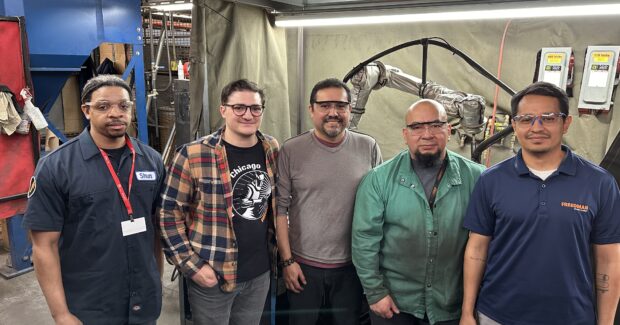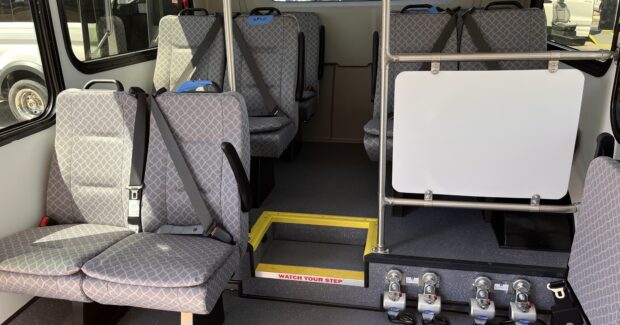Freedman Seating Creates new Careers with Welding Automation
Cobots created opportunities for Freedman to scale up productivity quickly by giving people more productive tools and adding more value.
Posted: June 14, 2024

Next time you sit in a bus, train or ferry seat, consider that manufacturing career opportunities come in many forms. Chicago, Ill.-based Freedman Seating Co. is a leading supplier of transportation seating and safety solutions and is now celebrating its 130th anniversary. At Freedman, welding automation demonstrates the company’s commitment to keeping manufacturing jobs in Chicago and elevating employees through training, support, listening to feedback and applying technology.
Freedman employs about 675 employees working in 350,000 sq. ft. of factory space; 110 of those employees are welders. Twenty employees work in one of the company’s 10 Yaskawa Motoman robotic cells, and eight work with four cobot systems, three from Vectis Automation and one from Lincoln Electric. The move into cobots occurred during the pandemic. Cobots created opportunities for Freedman to scale up productivity quickly by giving people more productive tools and adding more value to employees so that the company could invest more in people and equipment.
“We bought the cobots to aid the welders,” said Marvin Herrera, welding engineer, CWI, CWE, Freedman Seating Co. “During the pandemic, we had a shortage of welders. To address the issue, we converted an underutilized welding area into four booths for cobots. For the first cobot, we used one of our experienced welders because we wanted to prove it out. After that, we shifted our approach to upskilling employees that had potential.”
Reclaiming the Job
Cobot operator Delshun Rutledge started as a material handler. When Freedman posted new positions for employees who were interested in being cobot operators, Rutledge applied for the job.
“I was always interested in welding, and this was the next closest thing before the step up to actual welding,” Rutledge explained. “It’s a hands-on type of job where you are interacting with the machine.”
Rutledge is currently finishing the welding program at the Jane Adams Resource Corporation (JARC), which is located immediately next to Freedman and offers free manufacturing job training that includes a welding fast track program. Rutledge spent six months learning the mathematics behind welding in the classroom and six months completing hands-on training.
“Delshun will take a welding test and a written test,” Herrera said. “If he passes everything, he’s on his way to becoming a welder here.”
When it comes to the perception of robots taking people’s jobs and shipping jobs overseas, Rutledge has a wise take: “I want the work back. That’s why I went to school to become a welder.”
Engineering technician Enrique Gomez started in production as a welder more than 20 years ago. He learned how to program the cobots and is also learning how to program the robots. As an engineering technician, Gomez oversees the welding areas and welders. He tests and guides new hires so that they grow in their jobs.
“Most welders are pretty motivated,” Gomez said. “We have different tiers of welders here, so there’s always a way to move up, make more money, take advantage of opportunities and work on different steels.”
Some welders may want to focus on one process, while others want to know the science behind welding different materials and will test to move up to a higher tier. Gomez tries to motivate the welders to grow so he can bring new welders in.
“It’s a balance,” Herrera said. “Enrique does a lot of training and development. We don’t have a training team out here, so if the welding leads are swamped, we take on the role of trainers as well. Enrique goes out there to help train and retain welders within the company and helps them move up the tiers to things that they’ll enjoy more.”
Robot operator Leonel Caracheo, also with Freedman for more than 20 years, started in assembly and has moved into welding and cobot operation. His interest has led him to study robotics so he could learn more of the physics behind the process.
“I wanted to learn more skills for myself,” Caracheo said. “Technology is changing, and I want to keep up with the technology.”
New Careers
Tom Will is an intermediate welder who formerly worked at the Chicago Board of Trade and had no previous metal working experience. He took a welding class, enjoyed it and sought work at Freedman.
Will took a welding test and was told he needed more practice, so he attended JARC. In addition to offering industry credentials through the American Welding Society (AWS), JARC’s 14-week program includes day and evening training, an option for an OSHA 10 hour safety course and job placement services.
Will enrolled and was back at Freedman in a few months. His current job involves working with one of the traditional automation cells. He loads seat parts into a fixture, makes tack welds and few short welds not suited for the robot, loads the seat into fixturing on a turntable and hits the start cycle. After welding, he performs a visual inspection and then welds any areas that need retouching.
“Somebody who does this has to know about welding and be able to carry out quality control,” Will said. “You can’t have a person come in off the street and do this.”
All the welders working with automation note a common thread to their work.
“What’s kept me here is the support I get, the environment and the benefits,” Gomez said.
Up and Up
Welding also changed the arc of Herrera’s life. He planned to be a factory mechanic, quit a job he didn’t like, attended community college and took a welding class.
“I just fell in love with welding, melting metal, using my hands to make something and I’ve never stopped since,” he says. “After I landed a job at Freedman in 2014, Enrique showed me how to improve quality, improve my speed and how to troubleshoot machines.”
Herrera loved welding, but he continued to pursue his education and earned an associate degree in 2016. He quickly progressed to the role of supervisor in the welding department and then crossed over to a role in the manufacturing engineering department.
“When the previous welding engineer left the company in 2019, a lot of the responsibilities naturally fell on me, but I stepped up to the plate,” Herrera said.
In 2021, Herrera earned his bachelor’s degree, but he wasn’t done learning. “I wanted to take the AWS Certified Welding Inspector test — that’s a gold standard for achievement in the welding industry — because I wanted to keep pushing myself and earn a better living.”
Community Effort
While Herrera and the welders have a strong work history, Freedman also opens the doors for people who need a second chance, including those with a criminal history. The company is in Chicago’s Humboldt Park neighborhood, which is a disadvantaged area, and Freedman believes that good jobs are the way to improve the area.
“We work with a lot of community organizations, training programs and community colleges,” explained John-Paul Paonessa, marketing manager at Freedman. “When someone gets a job, it can completely change the trajectory of their life. That’s where community organizations come in because they help us find the candidates and train them on some of the soft skills that they were never educated on or lost through the years, and we get them ready for life in a workplace. When it comes to finding people with a good attitude, it’s a very competitive market.”
“Welding automation and our fleet of lasers and CNC equipment helps attract workers,” Herrera added. “Seeing that we use advanced technology can keep people in the manufacturing industry.”

















